Testimonials
testimonials | U-district | neighborhoods
Current Students:
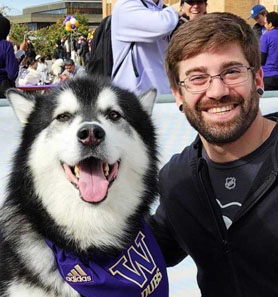 Evan McDermot
Evan McDermot
MacPherson Lab
Hometown: Leawood KS
Undergraduate: University of Kansas, BS Neurobiology
(photo:
meeting Dubs at W Day)
My two favorite things about the Genome Sciences department are the eagerness of everyone to engage in fun, scientific discussions and the interdisciplinary/cross-institutional nature of the research we do! As someone who does genomics-forward cancer research, the connection between the department and Fred Hutch has been a foundation of my studies. Collaborations between labs and institutions are common, and this only enhances the work we do. Additionally, I have received some excellent guidance from faculty, especially in times of stress and/or uncertainty, and I truly value the caring, intentional nature of the department as a whole.
As someone who grew up in the Midwest, I value the mountain views of the PNW and Seattle's proximity to the water (and fresh seafood)! While I'm an active but not outdoorsy person, there are plenty of sports groups to join, especially if you're interested in soccer. Seattle itself is a very sports-centric city and I would find it difficult to live somewhere that isn't. While not on the level of somewhere like Tokyo, Seattle's public transit is decent for a city of its size in the US and this allows me to commute to campus from further away (Bellevue).
Current Research: I am currently elucidating the roles for SOX4 and other transcription factors in small cell lung cancer chemotherapy response.
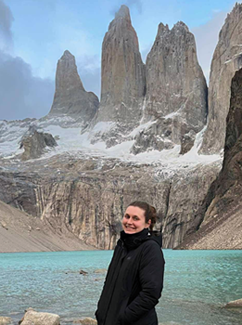 Abby McGee
Abby McGee
Shendure Lab
Hometown: San Diego CA
Undergraduate:
MIT, BS Biological Engineering
(photo: Torres del Paine, Chile)
- My favorite part of GS is the people! Everyone is approachable, the department feels really tight-knit, and there’s a strong sense of community. Friday research reports and happy hours are always a highlight, and I appreciate that the faculty genuinely listen to grad students and take our feedback seriously.
Seattle is an awesome place for grad school! There are three national parks within a few hour drive, tons of hiking and skiing options, and always lots of activities going on. There are also tons of cool breweries, trivia nights, and coffee shops!
Current Research: I work on building tools to study long-range gene regulation in the Shendure Lab.
Former Students:
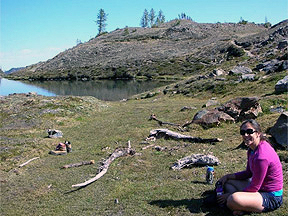 Keisha Carlson
Keisha Carlson
Queitsch Lab
Hometown: Spokane, WA
Undergraduate: Brown University
Current Position: Assistant Professor, Fort Lewis College
(photo: Chatter Creek, Woodinville WA)
My favorite aspect of our department is the diverse and cutting edge research. I look forward to Fridays every week because of research reports, when I get to hear about the brilliant research my peers are doing. It keeps me up-to-date on different areas of the field and often sparks ideas for my own research. I feel motivated to add to the discovery that goes on in this department.
Current research: I am interested in how organisms maintain robustness, or the ability to develop the same despite genetic and environmental perturbations; I hope to find a molecular marker for organismal robustness to enable us to test whether naturally robust individuals and naturally non-robust individuals differ in the inheritance of traits.
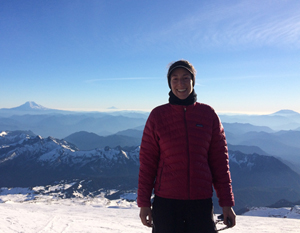 Flo Chardon
Flo Chardon
Shendure Lab (co-advised by Jay Shendure and Lea Starita)
Hometown: Santa Barbara, CA
Undergraduate: UC Berkeley, B.S. Chemistry
(Photo: ski touring in Mt. Rainier National Park)
My favorite part of UW Genome Sciences is the close and tight-knit culture we have and cultivate in our department. Coming from a large undergraduate institution, it is unique and special to truly know all my peers and the faculty in the department. This makes every day in the department fun and interesting, because I always have people to talk to about my science and it provides for a really easy and organic way to start collaborative projects. My other favorite part of the department is the incredible science I get to witness my peers do every single day. This is especially highlighted at our weekly Friday Research Reports during which students give the department updates on their research.
Current research: I am interested in developing new single-cell genomics technologies to better characterize genetic variants in disease-causing genes. I hope to be able to use rich phenotypic readouts to characterize variants, and to understand the biological mechanisms by which genetic variants mediate functional effects.
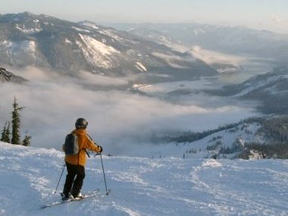 Michael Duyzend
Michael Duyzend
Eichler Lab
Hometown: Shoreline, WA
Undergraduate: Carleton College
Master’s: Cambridge University
Current Position: Resident Physician in pediatrics and medical genetics, Boston Children's Hospital and Harvard Medical School
(photo: Alpental, Snoqualmie Pass)
My favorite aspects of the Department of Genome Sciences include the accessible faculty, engaged graduate students, diversity of research areas, wonderful facilities, and amazing opportunities for collaboration. In addition, as an MD-PhD student I enjoy great access to medical resources. I love Seattle for its mild weather, bike-friendly ethos, and close proximity to to the great outdoors. Seattle is small enough not to overwhelm but large enough to excite, and I’m taking full advantage of the awesome food and drink scene here, among other things.
Current research: Understanding fundamental mutational properties of human genomes using next-generation sequencing data.
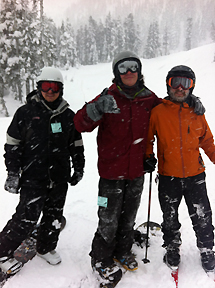 Keolu Fox
Keolu Fox
Nickerson Lab
Hometown: Hawaii
Undergraduate: University of Maryland
Current Position: Assistant Professor, UC San Diego
(photo: Mt. Baker, with fellow GS grads Billy Edelman and Aaron McKenna)
I chose UW Genomes Sciences because it is the best place in the world for human genetic variation research. Our department is strong because of the students we recruit, the faculty, the training we receive, and the NIH support. Publications are a priority, but the majority of first authors on papers that come out of this department are graduate students. We are extremely multidisciplinary and collaborative on so many levels, and we have diverse groups of people from different walks of life working and solving problems together.
My favorite aspects of the department are the family atmosphere and its "student-centric" nature, as well as its location. Seattle has snowboarding, fishing, coffee, craft beer, seafood, and a great live music scene. Seattle is also populated with a high proportion of interesting people; intellectuals, artists, and athletes make a very healthy community of people as a whole. And coming from D.C., Seattle is a very safe city.
Current research: Blood typing using human genome sequence data.
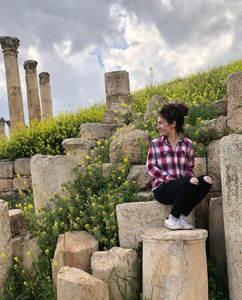 Sayeh Gorjifard
Sayeh Gorjifard
Queitsch/Cuperus Lab
Hometown: Rockville MD
Masters: Johns Hopkins, Molecular Targets & Drug Discovery
Undergraduate: Dartmouth College, B.A. Chemistry & Studio Art
(Photo: Jaresh, Jordan)
My favorite part of UW Genome Sciences is the supportive and understanding community I’ve found here, especially the positive atmosphere and the value the department has for graduate students. It’s rare for an institution to care about the overall experience of a graduate program, going above and beyond to make sure everyone feels included with social activities, mentorship, and work opportunities. Even in times of stress, I always know there is someone in the department I can ask for help (and I was always helped graciously). I particularly love how open Genome Sciences is to adapting the program to student’s needs with each coming year. Our education and happiness is their priority, and they have been nothing but flexible to accommodate both.
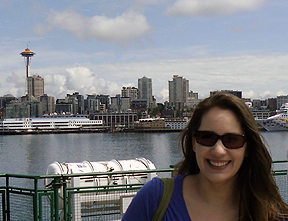 Elyse Hope
Elyse Hope
Dunham Lab
Hometown: Portland, OR
Undergraduate: Stanford University
Current Position: Sector Manager, Genome BC
(photo: Seattle skyline from the Bainbridge Island ferry)
Genome Sciences is the perfect blend of everything I was looking for in a graduate department: it's collaborative, equally rooted in experimental and computational genetics, and the students are happy. The research is driven by cutting-edge technology, all of which we have access to and much of which we develop. Extensive collaboration within the department means that new ideas can move from tinkering to development incredibly quickly, and the lack of hierarchy means that students and faculty think and work directly together.
The department itself is driven by its graduate students, on a level I have not experienced elsewhere. So much effort and money is dedicated to training the graduate students not just to be good experimental and computational scientists, but good speakers, strong writers, and effective collaborators. The faculty really invest in their students, and I love hearing in Friday research reports how the students are running with that investment with bold and exciting projects. This investment also shows itself in graduate student happiness. I feel like the program trusts us to be good scientists, and that trust has built a really close community.
The laid-back, family feel within the department is reflected in Seattle. It is a very friendly city with endless coffee shops, bookstores, pubs, forest trails, and lakes to explore. I've loved getting to know the different neighborhoods and it's just an awesome place to be living.
Current research: Impact of allelic variation in known biofilm genes on yeast biofilm formation; discovery of novel biofilm gene pathways using whole genome sequencing of experimentally evolved yeast populations
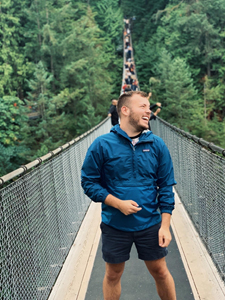 Nick Popp
Nick Popp
Fowler lab (co-advised by Doug Fowler and Jill Johnsen)
Hometown: Smithton, IL
Undergraduate: University of Chicago, B.S. Biological Chemistry
(Photo: Capilano Suspension Bridge Park, Vancouver, BC)
My favorite part of Genome Sciences is how collaborative and multidisciplinary the environment is. Everyone in the department is willing to take time out of their day to help students with technical issues, to improve their talks, or to just chat about how things are going. It makes coming to the lab enjoyable and productive at the same time and makes Genome Sciences an environment where a graduate student will thrive. In this way, it's unlike any other department I've visited or been a part of.
Current research: My goals are to develop novel genomic technologies for diagnostic and therapeutic use. I am currently working on methods to improve CRISPR/Cas9 gene editing and studying how variation in hemophilia B affects clinical course and severity using deep mutational scanning.
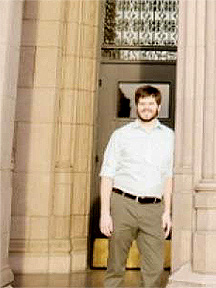 Matt Rich
Matt Rich
Fields Lab
Hometown: Mocksville, NC
Undergraduate: Princeton University
Current Position: Postdoctoral Fellow, University of Utah
(photo: Suzzallo Library, UW campus)
I chose to come to GS because of the obvious support the department gives to its graduate students, especially in terms of career preparation. The faculty are also amazingly supportive, more so than I experienced at other departments.
Current research: Developing technology for high-throughput assays of protein solubility; transcriptional engineering.
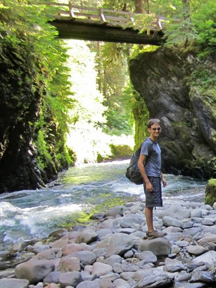 Sean Schneider
Sean Schneider
Thomas Lab
Hometown: Bainbridge Island, WA
Undergraduate: University of Washington
(photo: Graves Creek, Olympic National Forest)
By the time I interviewed here I had seen and worked in a number of schools and departments and I was genuinely impressed by the graduate program here. The students seemed cared about and happy. So many departments are dreary halls full of depressed and lost looking graduate students and Genome Sciences is a real alternative to that. Besides having happy grad students, the other thing that amazed me was that the department does an unusually good job at both having accomplished and intelligent faculty while keeping egos in check. So many other departments seem ruled by an iron fist by particular high-powered labs. We have our stars as well but here they are happy to let (and even help!) others shine too. Collaboration isn't just a buzzword here.
Current research: My work uses comparative genomics to study large gene families, endogenous viral elements that transferred into the host genome, and the interaction of these two players and what they tell us about evolution.
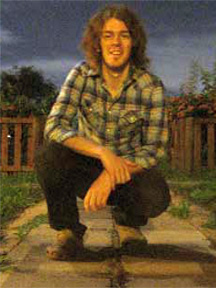 Matthew Snyder
Matthew Snyder
Shendure Lab
Hometown: Philadelphia, PA
Undergraduate: University of Pennsylvania
Current Position: Manager, Bioinformatics, Guardant Health
Unlike training programs at other major research universities, GS puts graduate students first. Here, students can lead their own research projects rather than playing second fiddle to postdocs. In my lab, students have complete intellectual freedom to explore their own research interests, and (fortunately) a budget to match.
Because I'm interested in translational genomics, being so closely affiliated with a top-tier medical school is critically important. In my lab, we have several close collaborations with clinicians, ethicists, pathologists, and other medical professionals at UW. These collaborations go beyond sample collection; the input from collaborators helps to shape research goals and methods.
Additionally, I appreciate the fact that student contributions to intellectual property are taken seriously here. In a technology development lab, we are frequently generating ideas for genomic technology that could one day lead to commercial products. My advisor and the university as a whole are serious about filing provisional patents, protecting the interests of students, and giving credit where credit is due.
Current research: Prenatal diagnostics. Low-frequency variant detection. Probably other things to come.
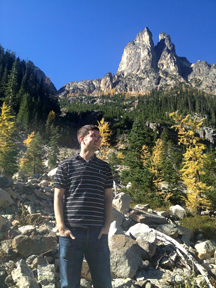 Andrew Stergachis
Andrew Stergachis
Stamatoyannopoulos Lab
Hometown: Seattle, WA
Undergraduate: University of Chicago
Current Position: Assistant Professor, University of Washington Medical Genetics
(photo: hiking in the North Cascades)
My favorite aspects of the Genome Sciences Department are the Department's: (1) strong emphasis on graduate student education; (2) collegial atmosphere among PIs, students, researchers, and staff; and (3) extensive brain power and resources.
Together, these three elements create an environment that encourages collaboration between different labs and foster opportunities for graduate students to take their research in unexpected but fruitful directions. For example, I have been grateful for the opportunity to work and publish with four different labs in the Department to date, which has allowed me to learn from the unique expertise each lab offers.
Current research: Developing and utilizing genomic and proteomic tools to elucidate how transcription factors regulate the genome during cellular and organismal development.